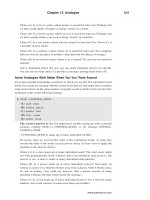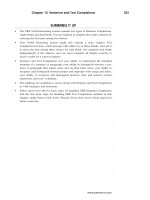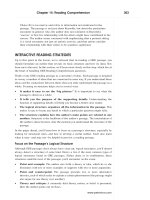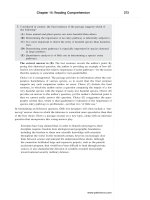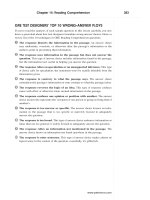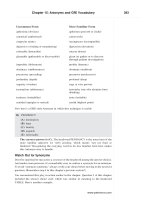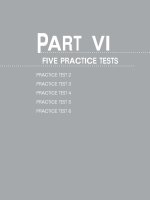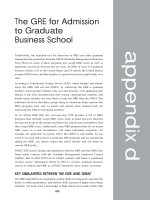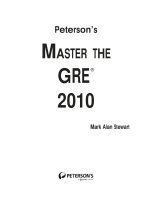Master the Gre 2010 - Part 34
Bạn đang xem bản rút gọn của tài liệu. Xem và tải ngay bản đầy đủ của tài liệu tại đây (53.74 KB, 10 trang )
Choice (A): Is a forest a place where lumber is stored for later use? Perhaps; but
we don’t really think of lumber as being “stored” in a forest.
Choice (B): Is a kitchen a place where an oven is stored for later use? Perhaps; but
we don’t usually think of an oven as being “stored” in a kitchen.
Choice (C): Is a silo a place where wheat is stored for later use? Yes. Choice (C) is
a possible answer choice.
Choice (D): Is a pipeline a place where oil is stored for later use? No; a pipeline
delivers oil from one place to another (often between two places of storage).
Choice (E): Is an animal a place where a zoo is stored? No; zoos are not stored in
animals.
You’ve eliminated choice (E); now you can easily eliminate choices (A) and (B).
You can also see that choice (C) provides a stronger analogy than choice (D).
Some Analogies Work Better When You Turn Them Around
If you have trouble formulating a sentence in which you use the first capitalized word
before the second, try starting with the second word instead. Just make sure to analyze
each answer choice in the same manner, using the second word first. Let’s see how this
technique works on the following Analogy:
5. STAR : CONSTELLATION ::
(A) sand : dune
(B) iceberg : glacier
(C) feather : bird
(D) river : ocean
(E) trestle : track
The correct answer is (A). You might have trouble coming up with a graceful
sentence relating STAR to CONSTELLATION, so try relating CONSTEL-
LATION to STAR:
“A CONSTELLATION is made up of many individual STARS.”
Of course, since we reversed the order of the capitalized words, we must also
reverse the order of the words in each answer choice. So here’s how to apply the
sentence to the answer choices:
Choice (A): Is a dune made up of many individual sands? The word sands might
not work grammatically in the sentence, but if you substitute sand particles,the
answer is yes—a dune is made of many individual sand particles.
Choice (B): Is a glacier made up of many individual icebergs? Not really; an
iceberg is a piece of ice that has broken away from a glacier. Until it breaks away,
it’s not an iceberg. (You could say, however, that a glacier consists of many
potential icebergs, but that would strain the analogy.)
Choice (C): Is a bird made up of many individual feathers? No; a bird has many
feathers, but a bird consists of much more than just feathers.
Chapter 12: Analogies 313
.................................................................
..............................................................................................
www.petersons.com
Choice (D): Is an ocean made up of many individual rivers? No; rivers might
contribute to an ocean’s waters, but oceans are apart and distinct from those
rivers.
Choice (E): Is a track made up of many individual trestles? No; a track rests on
top of trestles.
As you can see, by reversing the order of the capitalized words, we came up with
a sentence that captured the word-pair relationship and helped us reveal the best
analogy.
Pay Attention to a Capitalized Word’s “Charge”—Positive,
Negative, or Neutral
If one of the capitalized words has either a negative or positive connotation, the
corresponding word in the correct answer choice will be similarly “charged.” But if the
capitalized word is neutral, the corresponding word in the correct answer choice must be
neutral as well. Let’s apply this strategy to a GRE-style Analogy:
6. DETRIMENTAL : IMPACT ::
(A) fearful : timidity
(B) joyful : emotion
(C) painful : soreness
(D) sluggish : pace
(E) odious : smell
The correct answer is (E). The word DETRIMENTAL (harmful) describes a
negative type of IMPACT, which is neutral in itself. So the best answer choice’s
first word should have a negative slant, while its second word should be neutral.
You can eliminate choices (A) and (C) because, in each one, the second word
(timidity or soreness, respectively) has a negative charge. Conversely, you can
eliminate choice (B) because the first word (joyful) is positively charged. That
leaves choices (D) and (E). The word sluggish describes a very slow pace, but it
does not have a strong negative connotation. On the other hand, odious (which
means “repulsive”) is clearly a negative slant on the neutral word smell. But even
if you didn’t know what odious means, you could eliminate all other choices based
on how their words are charged.
Don’t Give Up If You Know Only One of the Two Words
in an Answer Choice
You can often eliminate an answer choice by knowing just one of the two words. To see
how you might apply this technique to a GRE-style Analogy, consider the following
example:
PART V: Verbal Reasoning314
.................................................................
..............................................................................................
www.petersons.com
7. DRINK : GUZZLE ::
(A) surrender : succumb
(B) swallow : regurgitate
(C) ingest : gorge
(D) breathe : respire
(E) engulf : envelop
The correct answer is (C). To GUZZLE is to DRINK without restraint in
amount. Considering choice (A), if you don’t happen to know what succumb
means, ask yourself what word might convey the idea of an unrestrained amount
of surrender. The concept of an amount of surrender doesn’t make sense, and so
it’s a good bet that choice (A) does not provide the best analogy. You don’t need to
know the meaning of succumb (to give in, yield, or surrender) to rule out choice
(A). Similarly, the concept of an unrestrained amount of swallowing doesn’t make
much sense, and so choice (B) is probably not the best analogy, either. (Regur-
gitate means “throw up” or “vomit.”)
By the same token, you can evaluate choice (C) without knowing what ingest
means, as long as you know that gorge means “eat without restraint in amount.”
Based just on this word, choice (C) looks like it might provide a good analogy.
Indeed, it does—to ingest is to eat. Choices (D) and (E) are incorrect because they
each provide a pair of synonyms.
Make Educated Guesses About the Meanings of Unfamiliar Words
Either of the following might provide a clue about the meaning of an unfamiliar word in
a GRE Analogy:
• Another word that resembles the word in any way
• The word’s root or prefix
To underscore this point, here’s a GRE-style Analogy in which both capitalized words
provide clues about what they mean:
8. HETEROGENEITY : ASSIMILATION ::
(A) pride : jealousy
(B) deformity : birth
(C) punctuality : attention
(D) delay : obstacle
(E) contention : victory
The correct answer is (E). The word HETEROGENEITY contains the prefix
hetero-, which means “different.” The word ASSIMILATION adds a prefix and a
suffix to the common word similar. Based on this information, it’s probably a good
bet that the meanings of the two words run contrary to each other. On this basis
alone, you can easily eliminate choices (A), (B), and (D). As for choice (C), the
words punctuality and attention are not closely related to each other.
That leaves choice (E). For the record, ASSIMILATION (absorption) typically
results in homogeneity (sameness or similarity); that is, it serves to reduce or
eliminate HETEROGENEITY (diversity in character). Similarly, victory for one
Chapter 12: Analogies 315
.................................................................
..............................................................................................
TIP
Use any clue a capitalized
word might provide to
eliminate answer choices and
improve your odds of picking
the correct one.
www.petersons.com
means defeat for another; so victory often eliminates contention (rivalry) between
two foes. The analogy, though not perfect, is strong enough.
Eliminate an Answer Choice Where There’s No Clear Link
Between the Two Words
If you find yourself stretching to find a link between an answer-choice word pair,
consider your dilemma a hint that you should eliminate that choice without even
thinking about the capitalized pair. Here’s an analogy that illustrates this point:
9. STABLE : MERCURY ::
(A) abstract : transcript
(B) tardy : meter
(C) public : celebrity
(D) narrow : proportion
(E) underground : crime
The correct answer is (A). Without even considering the capitalized pair, you
can eliminate choice (B), since tardy and meter are unrelated to each other
(unless you really strain for a connection—which the GRE test designers don’t
expect of you). In each of the remaining pairs, the two words are somehow
related. For the record, an inherent characteristic of MERCURY is that it is
unstable (the opposite of STABLE). By the same token, a transcript is by defi-
nition a complete and accurate record of a real-life event, quite contrary to
something that is abstract.
Be Cautious of Answer Choices Involving the Same Topic as the
Capitalized Pair
A GRE Analogy might include an answer choice containing words involving the same
general subject matter as the capitalized pair. Never assume it’s the best choice, but
don’t eliminate it solely on this basis, either. Always compare each answer choice to the
capitalized pair without regard to similarity or dissimilarity in topic. Here’s anAnalogy
that incorporates this type of red-flag answer choice:
10. TRAITOROUS : TRUSTING ::
(A) sophisticated : backward
(B) successful : envious
(C) pessimistic : rosy
(D) loyal : steadfast
(E) smart : ignorant
The correct answer is (B). A TRAITOROUS person betrays the trust of
another, of a TRUSTING person. The key here is that the two words are not
antonyms; rather, they define a relationship between contrary sorts of people.
The red-flag answer choice here is (D). The words loyal and steadfast both involve
the same concept as traitorous and trusting. But loyal and steadfast are simply
synonyms of each other, and so choice (D) provides a poor analogy—probably the
worst of the five choices.
PART V: Verbal Reasoning316
.................................................................
..............................................................................................
www.petersons.com
You can also eliminate choices (A) and (C), which merely provide pairs of anto-
nyms. As for choice (E), a smart person does not necessarily have any relationship
with an ignorant person. That leaves choice (B). An envious person requires an
object of that envy, usually a person who is successful in ways that incites the
other’s envy. The analogy with the capitalized pair is hardly perfect, but it’s
stronger than the other four choices.
ANALOGY CATEGORIES YOU SHOULD KNOW
Most GRE Analogies fall into one of several categories, identified here by sample
sentences. In each sentence, the two blanks indicate where you plug in the two words:
“________ is a key characteristic of ________.”
“________ is a function or use of ________.”
“________ runs contrary in meaning to ________.”
“________ operates against ________.”
“________ is a type, form, or example of ________.”
“________ is a place or environment for ________.”
“________ is a condition for or ingredient of ________.”
“________ is a part, element, or aspect of ________.”
“________ is evidence or a result of ________.”
Knowing these categories will help make your task easier. But don’t expect to solve
every GRE Analogy simply by plugging the word pair into one of these nine sentences.
This might work for easier questions, but for tougher ones you’ll need to refine the
relationship further to home in on the correct answer.
In the pages ahead, you’ll learn that each category includes at least a few distinct
patterns. For each category, you’ll find sentences and illustrative word pairs to help
you recognize each pattern when you see it on the exam.
“Key Characteristic” Analogies
In this type of relationship, one word helps explain the meaning of the other word. Look
for one of two distinct patterns to help you refine the relationship:
Defining characteristic
Ideal (but not necessary) characteristic
DEFINING CHARACTERISTIC
“________ is a characteristic that defines what a ________ is.”
“By definition, a ________ is ________.”
BRAVE : HERO
NOVEL : INVENTION (novel means “original or new”)
Chapter 12: Analogies 317
.................................................................
..............................................................................................
ALERT!
Be skeptical of answer choices
involving the same topic as
the capitalized pair, but don’t
automatically eliminate an
answer choice on this basis,
either.
ALERT!
These categories are the ones
you’re most likely to encounter
on the GRE—but don’t expect
every Analogy to fit neatly into
one of them. You’ll probably
encounter one or two
oddballs as well. So try to be
flexible in handling GRE
Analogies.
www.petersons.com
